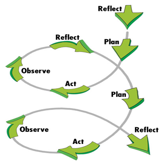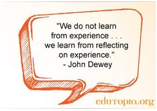Critical Thinking - Reflective Journaling
Attention

Learning Outcomes
Upon completion of this lesson's material, students will be able
- Explain the importance of reflective journaling
- Explain how reflective journaling will be helpful in practicum one
- Exhibit proficiency in critical thinking
Teaching
Critical thinking is not best described in definition but by a description of the process. When you are using critical thinking you are:
 |
Recognizing a problem Understanding the importance of the problem Gathering information related to the problem Interpreting the data you gathered Drawing conclusions Making a plan for improvement Implementing the plan Observing Then starting the process all over again |
In early childhood we use critical thinking on an everyday basis. For example: We hear a baby crying. This is an issue. We check the baby’s diaper, then we try to provide a teether or a soft blanket, then we make a bottle if nothing else is working and the baby shows signs of hunger (trying to suck on your arm or eating a toy etc.). Later on that day you think about how the baby seemed to have gone too long in the crying process. You think to yourself, “I wonder how I could soothe the baby quicker.” Then you remember the process you went through and decide that maybe you could look at the daily sheet to see when the baby last ate and start a bottle before you change their diaper. This way the bottle will be ready when you get out.
Poof! You have (on a small scale) just practiced critical thinking. In early childhood, we typically use the term reflective practice. The reflective practice process is similar to critical thinking but the process looks a little more like this:
 |
What happened? What did you think and feel about it? What are the positives and negatives? What sense did you make of it? What could you do differently? WHO can support you? What will you do differently next time? |
Reflective practice is something that could take some getting used to if you are not naturally a reflective thinking. It focuses more on the feeling you experience in relation to something that happened. Naturally, if a situation you experience doesn’t feel good, then it’s probably something to reflect about. To get the process started, this course will require weekly reflective journals.
The journals will be able to capture experiences that you need to process though. It will help you in understanding your practicum journey and how your own beliefs and values fit in early care and education.
You will be writing in this journal every week and it is a vital part of this practicum process! (See Lesson __ for more specifics)
Assessment
Critical Thinking Quiz
Review the article Can reflective practice guide me in making better decisions for my early childhood classroom. Think about it from your perspective as a student teacher striving for that teacher role. Provide and answer the following questions in essay format
- Why is reflective journaling important?
- In what ways do you think a reflective journal will be helpful for you?
Critical Thinking Discussion
Have you ever used a reflection journal before and how did you like it? If not, what do you think this will be like for you?